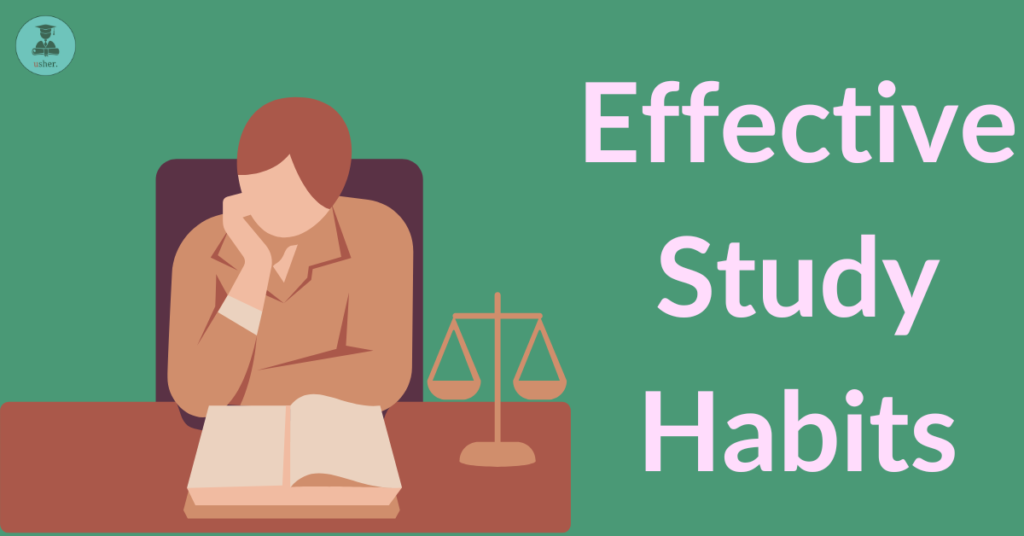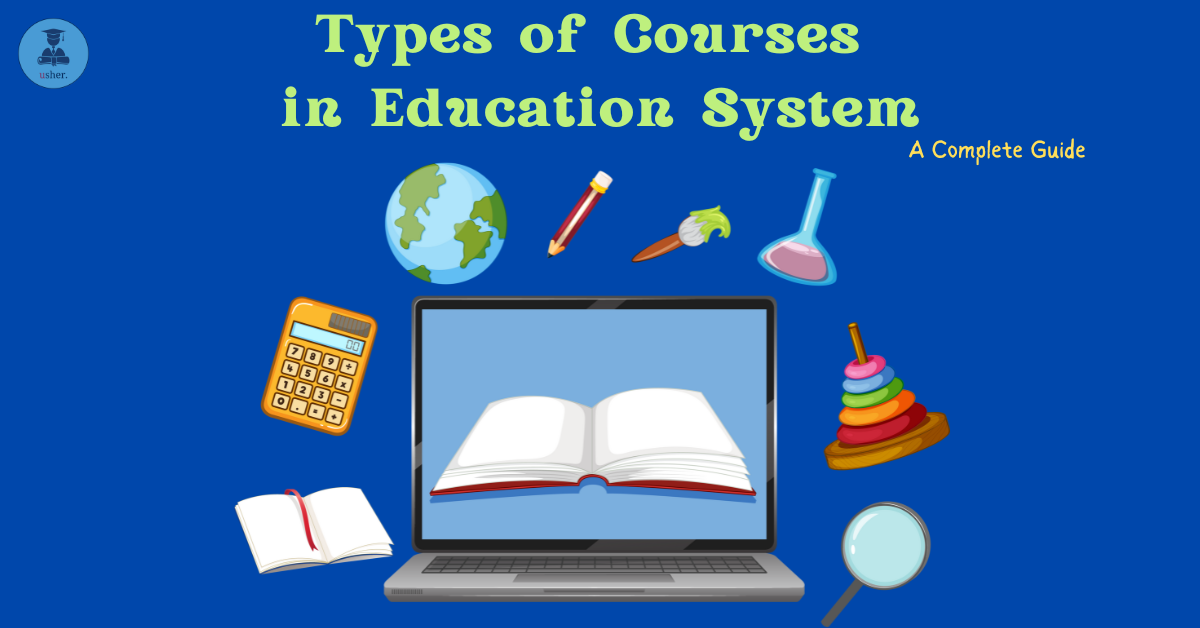We all want to excel in our studies and classes, but we have no idea how we can do that. With the start of every session we all feel an excitement that urges us to work better than the past year and cover up all our shortcomings. Initially we get motivated to put in our best effort and stay focused, but as the semester progresses, we often find ourselves struggling to keep up with the workload.
This issue can be overcome by making studying a HABIT!
Motivation is what gets you started. Habit is what keeps you going.
Jim Ryun
Effective study habits can transform your academic life, leading to better grades, increased retention of information, and a more enjoyable learning experience.
In our previous article, we have seen effective study techniques through which you can improve your focus, time management, and comprehension skills.
But this is possible when you have a habit of studying effectively.
In this blog, we will discuss effective study habits and strategies you can incorporate into your daily routine to ensure academic success. By consistently practicing these habits, you can build a strong foundation for learning and ultimately achieve your academic goals.
Understanding Your Learning Style
Before we move forward it is important to understand that each student has a unique way of learning and retaining information.
By identifying your learning style you can tailor your study techniques and build a habit around them to better suit your individual needs. This will help you maximize your study sessions and make the most of your academic experience.
People typically fall into one of four learning styles: visual, auditory, kinesthetic, and reading/writing.
To know more about different learning styles and which one is best suited for you, read our article – How to choose the right Learning style for you?
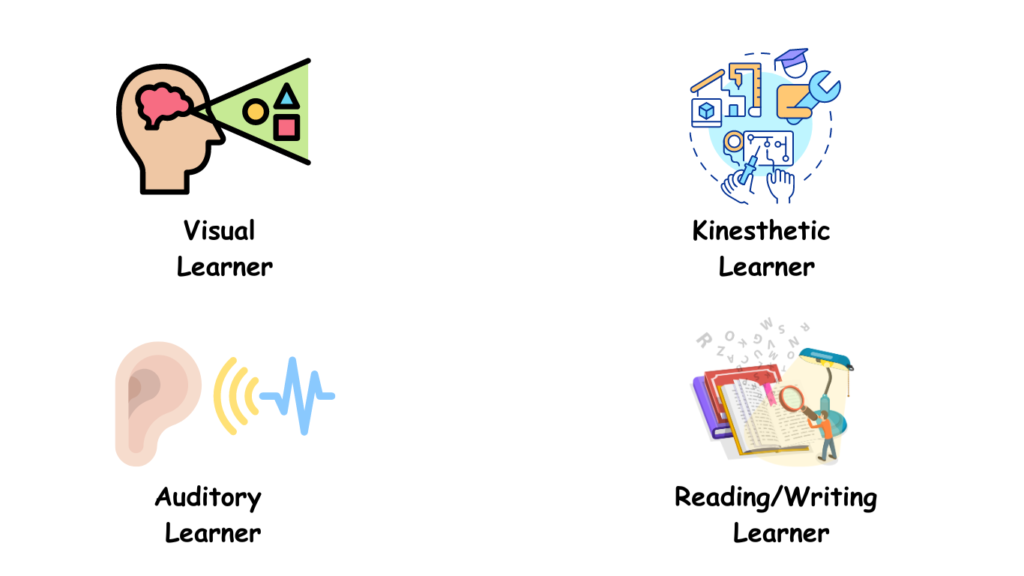
Habit 1 – Create a Study Schedule
Creating a study schedule will help you stay organized and ensure you allocate time for each subject or task. By sticking to a consistent study routine, you can improve your focus and productivity.
Here’s how to create one:
Assess Your Current Commitments: Start by listing all your current commitments, including classes, work, extracurricular activities and hobbies. This will help you identify the time slots available for studying.
Allocate Specific Times for Study: Dedicate specific times of the day to study sessions. Treat these times as non-negotiable appointments, just like your classes or work hours.
Balance Study with Breaks and Leisure Activities: Incorporating breaks is crucial for maintaining focus and preventing burnout. The Pomodoro Technique, which involves studying for 25 minutes followed by a 5-minute break, can be very effective. Also, ensure you have time for leisure activities to relax and recharge.
Use Tools and Apps: There are numerous tools and apps available to help you manage your schedule. Apps like Google Calendar, Trello, and Todoist can help you plan and keep track of your study sessions.
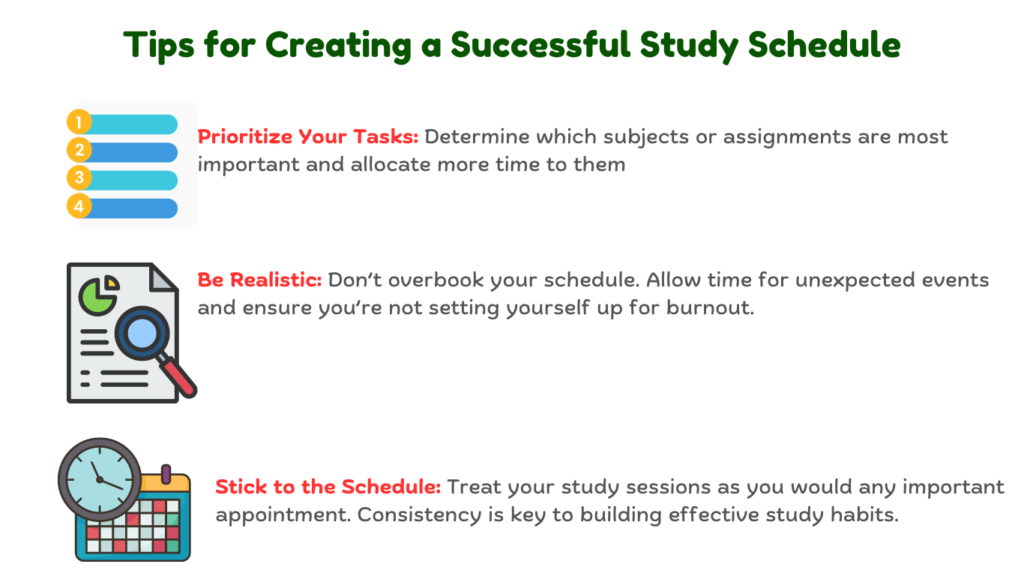
Habit 2 – Have a Dedicated Study Space
It may sound quite vague, but having a study space is essential for achieving your academic goals. This is the place where you can focus your entire concentration and study peacefully.
In fact, just having a space reserved for your studies is not the only requirement. You must also keep this area clean and organised.
You must have a separate pen stand to hold your stationery, a bin where you can throw all the litter and a space where you can properly arrange your notes so that you don’t have to worry about losing them. You can also keep fresh flowers or a few decor items and stick up motivational pictures to keep the place neat and organised.
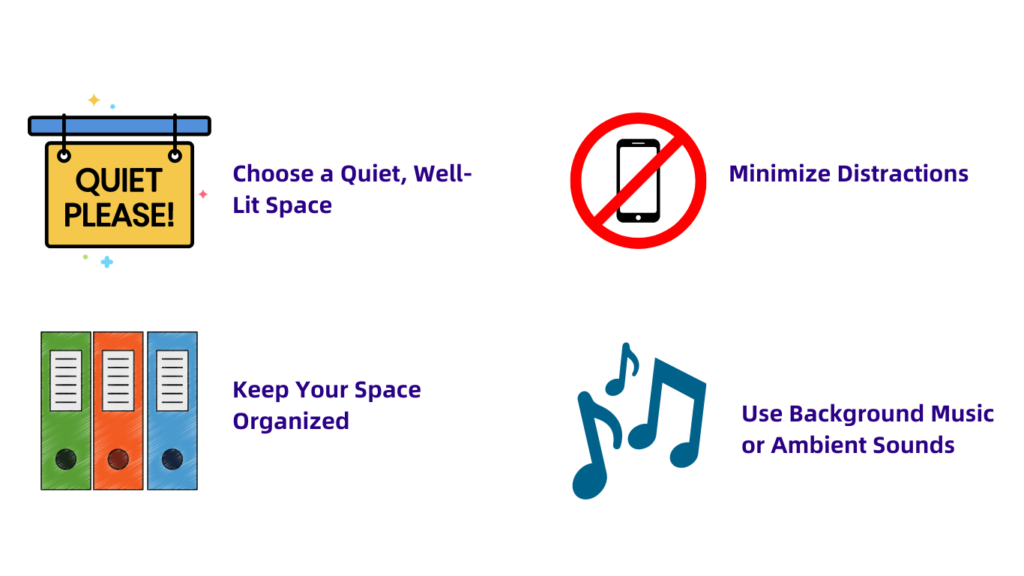
Habit 3 – Use Active Learning Techniques
Using active learning techniques can help you stay engaged and focused while studying. This would promote deeper understanding and retention of the subject.
Some of the active learning techniques include:
- Summarize Information in Your Own Words: After reading a chapter or listening to a lecture, summarize the key points in your own words. This helps reinforce your understanding and ensures you can explain the concepts clearly.
- Create Mind Maps and Diagrams: Visual aids like mind maps and diagrams can help you see the relationships between different concepts. They are particularly useful for subjects that involve complex processes or a lot of information.
- Teach the Material to Someone Else: Explaining what you’ve learned to someone else is a powerful way to reinforce your understanding. If you can teach a concept clearly, it indicates a strong grasp of the material.
- Use Flashcards and Practice Quizzes: Flashcards are great for memorizing facts and vocabulary. Practice quizzes help test your knowledge and identify areas where you need more review.
- Regular Review and Self-Testing: Regularly review your notes and test yourself on the material. This helps move information from short-term to long-term memory.
- Group Study Sessions: Discussing and debating topics with peers can provide new insights and reinforce your understanding.
- Application of Concepts: Apply what you’ve learned to real-world scenarios or problems. This helps solidify your knowledge and understand its practical applications.
- Active Reading: Engage with the text by asking questions, making annotations, and summarizing sections as you go.
Habit 4 – Set Goals for each Study Session
Having goals for each study session can help keep you focused and motivated. Whether it’s completing a certain number of practice problems or finishing a specific chapter, setting objectives can make your study time more productive.
If you didn’t finish as much as you had hoped to, remember that studying might occasionally take longer than anticipated. Try not to be too hard on yourself. Continue taking regular breaks and plan another study session.
Habit 5- Break up Your Studying
Cramming and studying one day before a test might help you get through the test but it is not an effective long-term strategy for retaining information.
You must learn to prepare in advance and break up your studying into manageable chunks over a period of time. This will not only help you retain information better, but also reduce stress and improve your overall understanding of the material.
Consistency is key when it comes to effective studying habits.
Habit 6 – Manage Your Study Stress
Studying can be stressful, especially when you have multiple exams or assignments due at the same time.
Recognize Signs of Study-Related Stress: Common signs include feeling overwhelmed, difficulty concentrating, and physical symptoms like headaches or fatigue. Recognizing these signs early can help you take action before the stress becomes overwhelming.
To counter this stress you can follow the following techniques:
- Mindfulness and Meditation: Practices like mindfulness and meditation can help reduce stress and improve focus. They can also help you become more aware of your body’s signals and prevent burnout.
- Physical Exercise and Healthy Eating: Regular exercise and a balanced diet can improve your physical and mental well-being, making it easier to cope with stress.
- Ensuring Adequate Sleep: Lack of sleep can exacerbate stress and impair cognitive function. Aim for 7-9 hours of sleep per night.
Also read: Why Balanced Diet is Essential for Students
- Time Management: Poor time management can lead to increased stress. Plan your study schedule in advance and stick to it.
- Socialize: Connecting with friends and family can provide emotional support and help you relax. This helps to maintain a healthy balance between socializing and studying to avoid feeling overwhelmed.
Habit 7 – Reward Yourself
Research found that treating yourself has been associated with improved self-control and can aid in the formation of positive habits. It’s important to prioritize self-care and recognize your accomplishments along the way.
You can motivate yourself to reach your objective by telling yourself you’ll receive a small reward if you complete the portion you intended to, or maybe a larger incentive if you have a productive study day.
Chocolates, an espresso, mini games, or a brief TV show episode can all be considered small rewards. Greater incentives for finishing a test or studying for a long time can be scheduling time for your favorite activity, enjoying your favorite food, or unwinding with friends.
Habit 8- Seek Help and Support
Utilize resources and ask for help whenever necessary, as it can help you overcome obstacles and stay on track with your goals.
There are numerous resources available to help you succeed academically:
Academic Resources: Take advantage of resources like libraries, online databases, and study groups. Libraries provide a quiet space and access to a wealth of information, while study groups can offer support and different perspectives on the material.
Seek Help from Teachers, Tutors, or Academic Advisors: Don’t hesitate to ask for help if you’re struggling. Teachers, tutors, and academic advisors can provide guidance and support to help you understand the material better.
Online Courses and Educational Platforms: There are many online platforms, like Coursera, Khan Academy, and edX, that offer courses on a wide range of subjects. These can be a valuable supplement to your regular studies.
To seek support, approach your teachers, tutors, or academic advisors for guidance. Friends, family and peers can help you stay motivated and provide additional perspectives on the material.
Conclusion
For academic success, you need to have effective study habits. You can make your study sessions better and reach your academic goals if you know how you learn best, set SMART goals, make a study plan, set up the best study space, use active study techniques, take good notes, deal with stress, and make the most of the resources that are available.
Happy Learning!

